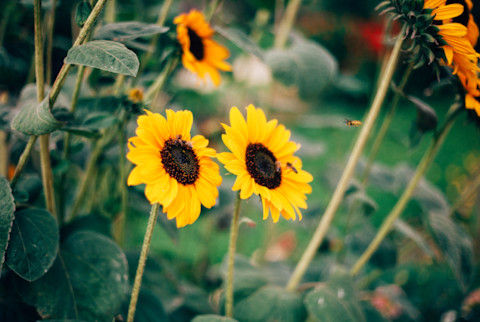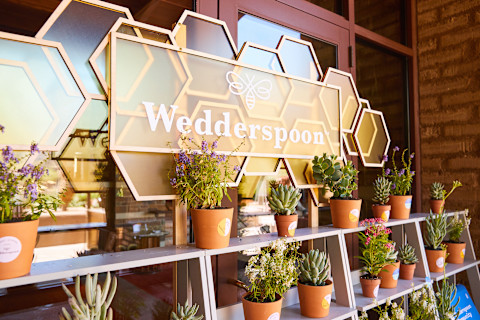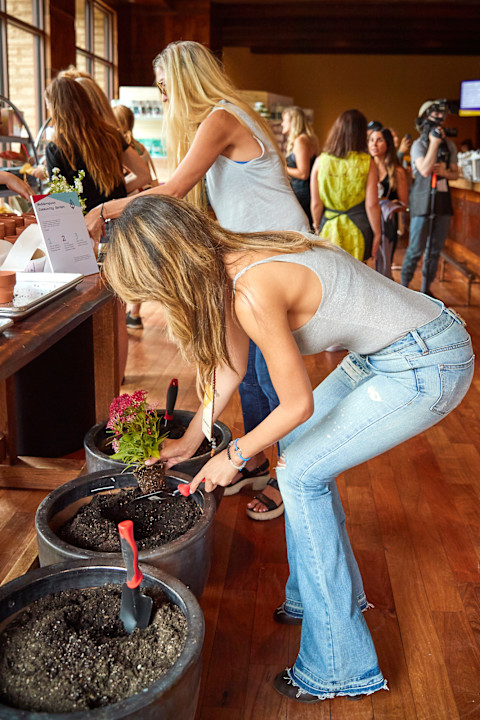
mbg is committed to working with companies that take a holistic view of health with products are as good for our bodies as they are for the planet. That’s why partnering with Wedderspoon makes so much sense: For this year’s revitalize event, mbg and Wedderspoon teamed up to pot bee-friendly plants that we then donated to a local children’s hospital. Here’s why bee health is so essential—and how you can get involved.

About 10 years ago, beekeepers across the U.S. started noticing that their hives were dying off at an alarming rate. It was sudden and unexpected, and it was the start of a phenomenon known as Colony Collapse Disorder (CCD) that is still a huge problem across the country and the world.
Last winter, an estimated 30.7% of bee colonies were lost across the U.S, and we don’t exactly know why. There are over 60 factors that could be contributing to CCD, and the mass die-offs we’re seeing are probably a combination of a lot of them. Applying pesticides and destroying bee habitats likely play a role.
Our bees are just plain stressed out, which is bad news for our food supply. A single honeybee colony can pollinate up to 300 million flowers every day and bees are responsible for pollinating around 75% of the fruits, nuts, and veggies we eat in the U.S. Yep, we have bees to thank for everything from avocados to alfalfa to apples (and that’s just the A’s!)
Over the last two years, bee species have added to the endangered list for the first time. We can help stop this scary phenomenon—but we all have to band together to do it. Here are a few ways you can be part of the solution.
1. Buy organic produce.
Yet another reason to go organic whenever possible! By supporting organic farmers, you’ll ensure that your food isn’t playing into the pesticide problem. A recent study found that bees have adverse reactions to crops that have been sprayed with pesticides—even in small doses. Even if they don’t kill the bees, these chemicals affect their memory and ability to learn so if you’re in the U.S., look out for the 100 percent USDA-certified organic seal.
2. Make your garden a bee-friendly zone.
Turning your backyard into a refuge for bees is actually easier than it sounds. Bees love native, single-petal, non-hybrid plants, so ask your local florist what they’d recommend in your area. Adding fruits, veggies, and herbs is another way to attract bees and give them new sources of nourishment. And interestingly enough, bees have trouble recognizing the color red so it’s best to go with yellow, white, violet, purple, or blue flowers or plants. You can also put a small basin of fresh water in your yard for thirsty pollinators.
3. Choose your honey wisely.

When shopping for honey, look out for brands that have made it part of their mission to protect bee populations, like Wedderspoon. Wedderspoon has teamed up with the Non-GMO Project and the Rodale Institute on projects that seek to educate people on how to be friends to bees and train the next generation of organic farmers. And they prize transparency with their line of Manuka honeys, specialty honeys, and honey-infused beauty buys and sweet treats, so you know exactly where it comes from.
It was a blast to team up with Wedderspoon on a gardening event for revitalize and watch hundreds of people plant pollinator-friendly flowers in little pots to display throughout the magical weekend. After the event wrapped up, we donated them to the Phoenix Children’s Hospital to bring a little dose of brightness to patients’ days.
4. Sponsor a hive.
By donating to The Bee Cause, you can sponsor a hive in a school classroom to give kids the opportunity to learn more about all the amazing ways bees support us. The organization has provided hives across 300 schools in all 50 states. Wedderspoon is working with this amazing cause to donate 10% of its website sales during the month of August.
Oh, and for that time period, you can also get a 10% discount on Wedderspoon products using the code MBGBEE. Win, win.
